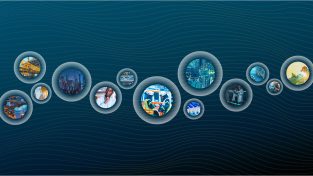In periods of crisis, public safety agencies are not alone. Dispatch, police, fire and EMS personnel have a plethora of resources available to guide them through tough challenges, such as the current coronavirus pandemic. Listen to this Public Safety Now podcast to learn how these critical resources aid in crisis management.
JW: Hi. Thanks for tuning into Public Safety Now on HxGN Radio. I’m your host John Whitehead, vice president of sales for U.S. Public Safety here at Hexagon’s Safety and Infrastructure division. It has been a crazy couple of weeks. If you’re a regular listener to our podcast, the world has completely changed as we know it, and public safety especially is reacting and preparing for all of the things that are now hitting us on a global level, but especially here within the U.S. We thought this was going to be a timely discussion.
We’ve got April Heinze from NENA here to talk a little bit about our topic today. And, really, the gist of this topic is we’re all in this together. We will get through this together. But there’s some overwhelming feelings going on in emergency services, but you don’t have to go through it alone. There are resources out there that can assist and get us through this coronavirus and this pandemic that we’re dealing with. So, April, welcome to the podcast.
AH: Hi. Thank you so much for having me. This is very timely. We have a lot of things that we’re working on to help 911 folks across the country right now. So, I’m really glad to be a part of this.
JW: No, that’s great. You know, I’ve been reaching out to some of my friends that are still sitting behind the desk with their headset on, and some of the changes that they’re going through, as I said there at the beginning, they’re reacting, just like the rest of us are, to the current situation and trying to figure out best practices. You know, I am very confident that we as a nation and we as a public-safety community are going to get through this. But it’s very interesting to me how some of the things that we’re dealing with today are things that we never had to really deal with in the past. I mean, even some of the large-scale incidents that we’ve seen that have really made some significant changes in the public safety world and the dispatch center, this coronavirus is actually probably going to make us better overall but causing a little bit of heartache here as we go through. And NENA’s right there at the forefront, trying to help us through it, aren’t they?
AH: Absolutely. You know, it’s interesting you say that. I remember I was in the PSAP 10 years ago, when we were dealing with the H1N1 and a possible pandemic back at that time. And we were doing a lot of contingency planning that, thank goodness, never had to come to fruition, but we definitely had some plans in place. And so I think, in a way, that, for many of us who already had planned those situations back then, we had a jumping-off point to get started with this coronavirus. But I am going to tell you that we are definitely in unprecedented times and that we’ve never had to actually put a plan like this into place. And it’s definitely a different world that we’re going to be living in moving forward.
JW: Yeah. I’ve been keeping up with, as everyone has, watching the news and watching all of the data that’s coming in on that side. But then on my own, just kind of out there watching some of the other public safety-specific blogs and areas that’s online. There was a part of me that had to chuckle and that’s just because I, too, was in a dispatch center, so I kind of know that while this can seem funny, it’s definitely a nuisance. You know, agencies are putting the word out to the citizens: please don’t call 911 to tell us that they can’t find certain supplies at the store. Please don’t call 911 to ask us where to go buy toilet paper, for example. And I know that sometimes that might be a little comic relief for us, but this is so much deeper than just how to call 911. I mean, I’m seeing things now. How do people work within this environment? And it’s a list of different things that, yeah, we probably should be thinking about all the time, but we don’t. We kind of come in and do our jobs day to day. And now this in this incident is really making us think a little bit twice about what we are doing. Simple things: disinfecting and wiping down our work desk before the shift and at the end of shift. And supervisors don’t walk over and grab a headset off of somebody and use that headset. It’s some of those simple things I’m seeing.
But I’m looking right now on NENA’s website. And NENA has put a whole coronavirus resource page together, haven’t they?
AH: Yes, we have. Yep. You can go to nena.org/covid19, and that will take you right to that page. We’ve got quite a list started, and that list is going to continue to grow. We’ve added a few resources to the list, actually, today. A couple of new resources that we added today were specific to the deaf and hard-of-hearing communities and how to handle notifications and communication and things like that. So that was a new add today.
We’ve also added some other things, things that people don’t really think about initially, but things that are definitely going to be burdensome as this pandemic wears on. Because right now, we’re just at the very beginning of it here in the U.S. And as it wears on and people are stuck at home and having to be isolated from everybody and with all of their family, anyone who’s ever worked in PSAP knows that over Christmas break and long periods of time where the kids and the family are stuck home together, incidents of domestic violence go up and incidents of folks who are having mental health issues go up and increases in isolation and loneliness are going to be seen.
So, our friends at the Crisis Text Line have given us some resources as well. There’s the Crisis Text Line texting number that folks can use, PSAPs can refer people to, which is 741741. And they can just simply text the word hello, and a live, trained human crisis counselor will be on the line with them. That’s a 24-hour-a-day, seven-day-a-week text line. So that could be very beneficial for the PSAP community.
There are also various different resources in case PSAPs are still in need of planning because we’ve had a lot of PSAPs that are out there and have done a lot of preplanning. And others are at that point where they just simply don’t know what to do. They know they need to do something, but they don’t know what to do. We’ve had some folks who are very, very generous and provided their COOP plans for us. They’re—I’m totally lost at what COOP stands for here—but those plans will help them to walk their way through the planning for this… and it’s ‘Continuity of Operations Plans’. But it’s for pandemic conditions in particular. We’ve got two different plans that are on that website that folks can click on and look at and utilise as a template for their own plans. We’ve also—go ahead.
JW: No, I was going to say, just to jump in there, yeah, I was actually looking at that. Those resources really help out agencies that may be trying to build those out themselves today. And we talk about that a lot here on this podcast is you don’t have to reinvent the wheel. You don’t have to go out there and pretend that you’re all alone. So, I’m looking at these COOP plans here in Charleston County, South Carolina. You’ve got DuPage County, Illinois, or DU-COMM, if you will. I’m very familiar with DuPage County. And I know Linda Zerwin and the team up there. They worked long and hard to try to prepare for these types of items. And if there’s agencies out there listening to this, and they’re trying to figure out, where are these resources? I was impressed with some of the areas out here because everything from preparing for a pandemic influenza, recommendation protocols for 911 personnel and PSAPs, that’s some really good information. And then to your point, these Continuity of Operations Plans coming out of Charleston County and DuPage County, Illinois, these are the types of things we can build on. And what I like, just kind of glancing at it was, everything level one, level two. It hits all the areas that public safety agencies are going to need and helps them in their reaction times. It’s good information to know that is out there.
AH: Yeah. NENA also has a couple of standards that can also assist during these times. We’ve got a whole list of contingency planning standards, but two in particular that PSAPs could utilise during the situation. One of which is the Communications Center/PSAP Disaster and Contingency Plans Model Recommendations. And that specifically covers best practices and guidelines for staffing, I.T. security, redundant systems, situations requiring evacuation, evacuation procedures, returning-to-normal-operations procedures, etc. The other one that is really very valuable during this time is the PSAP Survivability Information Document, and that also talks about several of these various different types of situations and how to mitigate those situations. So, we’ve definitely got a list of stuff here going. We are also working on many other guidelines as we move forward. And as those guidelines become available, we’ll be posting them here, too. What you see today, it will be continually updated throughout the coming weeks.
JW: Yeah. So, just like the rest of our lives have kind of changed here over the last few weeks, this, too, is continually being updated. It sounds like checking back regularly is some good advice for agencies that are trying to figure out how to deal with this epidemic and how to get through it here.
I did like the one thing that stuck out, and it’s a video out there. It’s self-care during the outbreak. And I think that’s one area that we definitely need to focus on. It’s that as dispatchers, as emergency responders, we’ve got the weight of a lot of people’s issues on our shoulders at any given time during the day. And that self-care is something I think that is just, it’s so important, right? I mean, we need dispatchers that are healthy. We need first responders that are remaining healthy. And I know we continue to put ourselves into situations that most people would see as dangerous. But with the right training and the right knowledge, we get through every day, and we get through the shifts. And I think that self-care is something that I was really impressed that was out there, because I think that that’s very important for dispatchers to remember.
AH: I’m so glad you brought that up because NENA has also started a wellness continuum on our website, specifically for self-care. So, the Continuum Initiative is a comprehensive approach to wellness in the 911 industry. We’ve brought together 911 professionals, resources, standards, ideas, trainings, etc., and we’ve got them listed.
What we’ve got so far is already listed on the website. If you go to the NENA website, under Programs, the very first tab is the Wellness Continuum. And then, once you get in there, it gives you the ability to go to the resources we currently have and to submit resources. So, in the event that you have a really great resource that we don’t have listed, you can also submit that so we can put it up on our Continuum site.
But we’ve got things listed on here, including coping, coping with post-tragedy-care checklist. We have a leader’s post-tragedy-care checklist, so in the event that you have to deal with a loss in the PSAP or the public safety community, what to do and how to handle that. We’ve got coping with suicide loss, employee assistance program proposals, compassion, fatigue, supporting a guide for peer-support programs, and the list goes on. So, definitely, that is another great place for folks during this time. If they are feeling a need for some personal care, that’s a good place to go.
JW: Yeah. No, I appreciate that, because, again, as I said there at the beginning, we’re in this together. We will get through this together. But you’re not out there all alone. And that doesn’t mean just at the agency level. That means at the dispatcher level or the emergency responder level. I mean, there’s a lot of things out there that are available. A lot of assistance is available. You brought up some really good topics that, not only are we going to be dealing with the illnesses and the influx of calls just around that, but now, all of a sudden, you’ve got people held up in their home for multiple days. And while that sounds fun, and while that sounds like a nice little vacation for some, for some people that’s not. And for some people, that becomes a stressor in and of itself. And I think that making sure that the calls that they’re dealing with, that we’ve got that reaction to be able to assist people with these calls that they’re going to be getting, I think that’s really good.
Anything else that you want to share with the public safety community here? This one, we’re going to be wrapping up, and I thought I’d just give you some time to see if there’s anything else you want to share from NENA.
AH: Just wanting to make sure that everybody knows that NENA’s here for you. And if there is something that you are facing right now in your PSAP and you need additional assistance, do not hesitate to reach out to us. We will do everything in our power to make sure you get that resource. If you go to the NENA website, under the About NENA, there is a staff page, and you can simply click on my name, April Heinze, and you can send me an email. But I will also give you my email address. It’s aheinze@nena.org. Feel free to reach out. We’ll do what we can to help you out. If we don’t have the resource, we will do what we can to make sure you get it.
JW: Yeah. And a couple of things I think are worth repeating here, as we talked about this resource page. If you go to nena.org, it is right there on their banner. You can click on View Resources, and it’ll take you to the resource page. If you’re looking for any of the other information, you can have any of your callers text hello to 741741. They’ll reach a live, trained human crisis counselor 24/7. All of that information is out there on the website, and I think it’s good information, and I’d recommend everyone to get out there and grab it as needed, or preplan and get it before it’s needed.
A big thank you to our guest here, April Heinze. To hear additional episodes or learn more, visit us as hxgnspotlight.com. And thanks for tuning in.
















